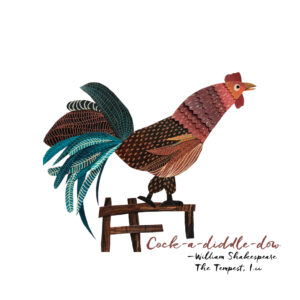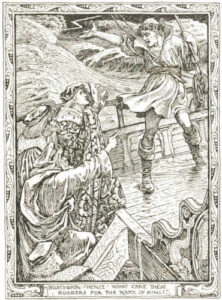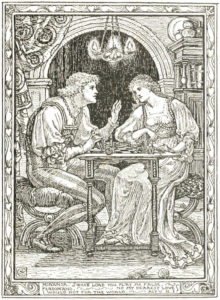 I ran across a bunch of Tempest references last week, and was reminded each time how much I enjoy the opening scene. I was even trying to think of a gimmick post that would allow me to talk about my enjoyment of the boatswain character. I called it “One Scene Wonders”, but then remembered he technically appears at the end of the play as well.
I ran across a bunch of Tempest references last week, and was reminded each time how much I enjoy the opening scene. I was even trying to think of a gimmick post that would allow me to talk about my enjoyment of the boatswain character. I called it “One Scene Wonders”, but then remembered he technically appears at the end of the play as well.
Then I figure what the heck it’s my blog I can write whatever I want.
How much do you love Boatswain? From his opening “Cheerly my hearts! Yare, yare!” it’s like he’s got his own language and personality, even though he doesn’t even merit a proper name.
Boatswain
I pray now, keep below.
He’s also got patience. First he tells his passengers, “Keep below.” Then he politely tells them, “Stay out of the way, you’re doing more harm than good up here.”
Boatswain
You mar our labour: keep your cabins: you do assist the storm.
Then when Gonzalo goes and name drops the King, our hero does exactly what any worker would do when told the suits were coming. He says, “If you can do it better than go right ahead, otherwise get out of the way.”
GONZALO
Good, yet remember whom thou hast aboard.
Boatswain
None that I more love than myself. You are a
counsellor; if you can command these elements to
silence, and work the peace of the present, we will
not hand a rope more; use your authority: if you
cannot, give thanks you have lived so long, and make
yourself ready in your cabin for the mischance of
the hour, if it so hap. Cheerly, good hearts! Out
of our way, I say.
He’s not even done. After complaining that his passengers complaints are louder than the storm, he sees them returning and asks, “Are you trying to get us killed?” When Sebastian swears at him he says, “If you’re going to stay out here pick up a rope!”
Boatswain
Down with the topmast! yare! lower, lower! Bring
her to try with main-course.
A cry within
A plague upon this howling! they are louder than
the weather or our office.
Re-enter SEBASTIAN, ANTONIO, and GONZALO
Yet again! what do you here? Shall we give o’er
and drown? Have you a mind to sink?
SEBASTIAN
A pox o’ your throat, you bawling, blasphemous,
incharitable dog!
Boatswain
Work you then.
This poor chap’s just trying to do his job and not get them all killed, and these sorry fools are all getting in his way. Even Gonzalo has to acknowledge, “I like this fellow.” Granted, I’m not sure it’s a compliment to say “I see him more fated to hanging than to drowning,” but we’ll take what little appreciation we get.
GONZALO
I have great comfort from this fellow: methinks he
hath no drowning mark upon him; his complexion is
perfect gallows. Stand fast, good Fate, to his
hanging: make the rope of his destiny our cable,
for our own doth little advantage. If he be not
born to be hanged, our case is miserable.
All of Shakespeare’s openings are great, in their own way. I like this one because as far as setting the tone of the rest of the play goes (see Macbeth, Hamlet) it’s really more about what Gonzalo says after Boatswain’s big moment, all that stuff about “give a thousand furlongs of sea for an acre of barren ground” because in the next scene we see the island. So really the interaction with Boatswain is kind of extra, isn’t it? Sure it introduces the bad guys and gives a taste of their personalities but there’s plenty of ways he could have done that. I’m glad he picked this one.
Anybody else love seeing this guy make his brief appearance?
Yare, yare!



 I ran across a bunch of Tempest references last week, and was reminded each time how much I enjoy the opening scene. I was even trying to think of a gimmick post that would allow me to talk about my enjoyment of the boatswain character. I called it “One Scene Wonders”, but then remembered he technically appears at the end of the play as well.
I ran across a bunch of Tempest references last week, and was reminded each time how much I enjoy the opening scene. I was even trying to think of a gimmick post that would allow me to talk about my enjoyment of the boatswain character. I called it “One Scene Wonders”, but then remembered he technically appears at the end of the play as well. I saw a post on Reddit today that asked, “What’s the first thing you think of when you hear the word Shakespeare?”
I saw a post on Reddit today that asked, “What’s the first thing you think of when you hear the word Shakespeare?”